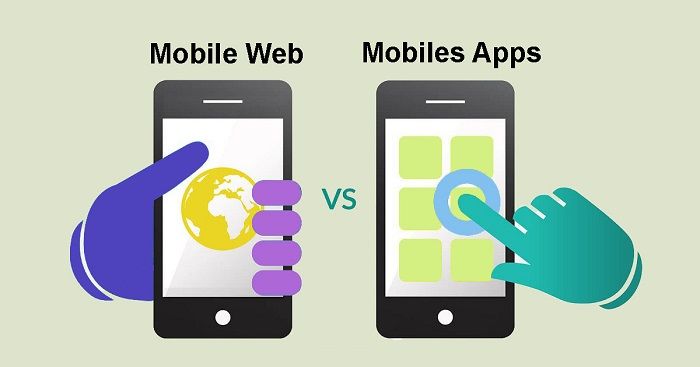Pros and Cons of Mobile Websites and Mobile Apps – If you haven’t already, it’s time to start thinking about building a mobile platform for your business.
Table of Contents
Pros and Cons of Mobile Websites and Mobile Apps
With the increasing use of smartphones and tablets everywhere, more people are accessing the internet from mobile devices than ever before.
In fact, in 2017, more users own and use web-capable mobile devices. The important question is not whether you should migrate to mobile, but how?
If you are planning to build a mobile presence for your business or organization, one of the first considerations that may come to your mind is whether you want to create a mobile application or mobile website, or maybe both.
From cost to speed and accessibility, mobile apps and mobile websites are very different, and determining which one is best suited for your business depends on what you want to achieve from having a presence on a mobile device.
What is the Difference?
Before you can evaluate the benefits of a mobile vs. application, it is important to understand the main differences between the two.
A mobile website is basically the same as any other website – it uses browser-based HTML pages that can be accessed by handheld devices and tablets.
Unlike websites built for desktops, mobile sites are designed for handheld displays and much smaller touchscreen interfaces.
Larger buttons and calls to action for finger tapping, increased spacing between elements to avoid tap conflicts, and fast load times are examples of elements included on mobile-optimized websites.
Over time, responsive web design is becoming the new standard for websites that are not only mobile-friendly,
Mobile apps are actual apps that are downloaded and installed on your mobile device, not rendered in a browser.
Users visit device-specific app marketplaces such as Apple’s App Store or Android’s Google Play to find and download apps for specific operating systems. Apps can pull content and data from the Internet, in a similar way to websites, or can download content so that it can be accessed without an Internet connection.
Mobile Site
There are three main ways to create a mobile site:
- You can create a separate mobile website with its own URL that redirects mobile visitors when they try to open your site from a mobile device.
Instead of directing mobile visitors, you can use a CSS file to make your desktop URL available to mobile users.
Using responsive web design, you can create a website that adapts to the width of the browser window.
Here at S9 Digital, we always recommend responsive websites to our clients.
Responsive web design optimizes your site for all screen sizes, whether on mobile or desktop, and allows your site to react to any window size adjustments made by the user.
Additionally, Google recommends responsive design as a best practice for SEO when building websites for smartphones, as Google prioritizes mobile-friendly sites in its rankings.
Pros:
Responsive websites have several advantages over native mobile apps. The first is that responsive websites are much easier to develop and maintain. While new apps must be developed for each mobile operating system.
you can create a single responsive website that users can reach from any device. Designing a mobile-optimized website is also much more cost-effective, and is often included in the cost of creating a new website.
Responsive website design also doesn’t require you to go through an approval process to publish your content. While it is clearly important to conduct a thorough QA process of a website before it is released.
a responsive website will not be reviewed by others for approval. This external review process is necessary for anyone trying to get their app into the app store and can sometimes create serious problems for mobile app design.
One of the most important advantages of mobile websites is the fact that websites attract more viewers than apps. According to a recent Morgan Stanley report, the web is driving website application traffic twofold.
This is due to the fact that a company’s mobile site is closely tied to all of its marketing activities, including email, SEO, social media, etc. Business mobile apps are not nearly as connected as rich.
Not only does this interconnectivity allow websites to reach more people than apps, it also means that mobile websites provide a more consistent brand experience across channels and devices.
Cons:
While responsive websites are easier to develop and capable of reaching more users, they can’t compete with apps’ ability to create engaging, high-performance user experiences.
Compared to native apps, responsive websites often experience poorer performance on mobile devices. Even the best mobile website designs depend on the network used to access them. Often network access, quality, and speed differ from one location to another.
Compounding the speed issue is the fact that mobile users are much more demanding than those viewing your site on a desktop, as they are usually on the go and looking for a quick answer. Desktop users at home won’t be put off by an extra click here and there when usability issues are encountered. However, mobile users will leave your mobile version of the site if it is difficult to navigate or if the loading process takes too long.
Mobile websites also lack the ability to access and use all the features of a mobile device (camera, GPS, etc.). This makes it difficult to create an experience that fully engages your users.
In addition, some businesses (such as Uber) may provide services that rely on access to GPS or mobile device cameras, and they may find a responsive website insufficient for their needs.
Another significant drawback of mobile sites is the fact that tracking user behavior can be more difficult. Because mobile websites are not tightly knitted with customers’ devices, businesses can’t take advantage of all the important data about key demographics that mobile apps can collect.
When You Need It:
Almost every business needs a mobile website, especially those that consumers tend to look for on the go. This includes restaurants, retailers, entertainment venues, etc. People can already see your website on mobile devices; however, it doesn’t seem very good because it’s not designed and optimized for mobile.
Everyone needs to be able to browse your website easily, and they need it to work efficiently on mobile devices so they can quickly find the information they’re looking for. If you’re a small business on a budget or want to offer mobile-friendly content to as many viewers as possible, a mobile-responsive website is the way to go.
Mobile Apps
Native mobile apps are written in the language of the operating system of the device they are installed on – Android, iOS, etc. These apps are usually downloaded from online stores – the Apple App Store on iOS or Google Play on Android – and installed directly on the device. They exist outside of an individual’s browser and have their own icon on that person’s mobile home screen.
Pros:
Responsive websites require an internet connection and a static navigation user interface that reflects the overall design of your website. Mobile apps, on the other hand, can be accessed after installation without using an internet connection.
Mobile apps allow businesses to always be directly connected to the user’s phone. This gives businesses access to users that responsive websites cannot provide.
In addition, applications can also take advantage of device features, information, and hardware, such as location services, cameras, and vibration notifications. Using this feature effectively allows apps to better connect with everyday users’ experiences with their phones in a way that responsive websites can’t.
Native apps also generally have a more friendly UX design than mobile websites. Instead of being redesigned to fit the mobile platform, they were built specifically for the mobile audience from the start.
According to a recent study, 85% of participants said they prefer mobile apps over mobile websites, and their preferences were found for reasons such as speed, convenience, and ease of use.
Native mobile apps have an inherent advantage over mobile-optimized websites when it comes to engagement.
Out of a sample of 56 million people, 65% of impressions with businesses on mobile devices came from mobile browsers while only 35% came from mobile apps.
However, the average app user consumes 2.4 times as many impressions with a single brand. This means that while a mobile website can increase exposure to your business, a mobile app will drive engagement with individual users and increase the amount of time they spend connecting with your business.
Cons:
Creating, publishing, publishing, and maintaining apps can be much more expensive and time-consuming than managing a mobile website.
You must create the same application multiple times for each operating system, as each application must use the device’s native programming languages: Java (Android), Objective-C (iOS), and Visual C++ (Windows Mobile).
This can be a tedious process, and you could receive a lot of resistance from audiences who may feel frustrated if they haven’t been able to access your app on a particular device.
Another long-term downside is the app store process. If you want to reach people who use Apple and Android products, you must submit your application for approval on the Apple App Store and Google Play Store.
Guidelines for acceptance in app stores are not written in stone, and as they change, you must ensure that your app remains compliant.
In addition, any changes in functionality or design made to the application require the user to update it manually, not automatically. The need for apps to be downloadable and manually meant that many users would be working on different versions.
Also, most businesses need a website as well as an app, so understand that if you decide to build an app (unless you plan to abandon the website altogether, which isn’t appropriate), you’ll also need to create a mobile website.
When You Need It:
If you’re developing games, e-commerce stores, or applications that serve very specific purposes that can’t be accomplished effectively via a web browser, the native app option is ideal.
Also, if you already offer a popular web-based service, a native mobile app may be a worthwhile investment, as it will provide tremendous performance benefits over using the mobile web.
The fact that the app is reliable with device features and accessed without an internet connection, is an excellent choice for companies looking for greater interaction with their mobile users.
Which Should Your Organization Choose?
Understanding what your customers are looking for from a mobile platform is a great way to help decide if a mobile app or mobile website is better for your business.
If you have an audience that is just trying to connect with your business and find information about your services, accessibility, and mobile scope that makes them a much better choice on native apps.
If your audience is trying to find your product or service and entertain themselves, a mobile app is almost certainly the way to go.
However, it is important to remember that the two options are not mutually exclusive. Many successful organizations have mobile-friendly public websites for their general web presence and applications that can accommodate more specific requirements.
Conclusion:
In the end, choose between a mobile app and a mobile website on what your business wants to achieve with its mobile.
Understanding the power of mobile websites and mobile apps within that organization with your digital transformation goals will enable you to implement a mobile strategy that best fits your organization’s needs.
Don’t forget to bookmark and always visit every day Technadvice.com because here you can find the latest technology information such as How-to Guide Tips and Tricks Blogging Digital Marketing Windows Android Root Social Media games, ETC. Best of luck.





![100+ Free course hero accounts and passwords [June 2024] Free course hero accounts and passwords](https://technadvice.com/wp-content/uploads/2023/06/Free-course-hero-accounts-and-passwords-100x70.jpg)
![3 Ways To Remote Android from PC Laptop Windows 10 [2024] How to Remote Android from PC](https://technadvice.com/wp-content/uploads/2020/07/How-to-Remote-Android-from-PC-3-100x70.jpg)




